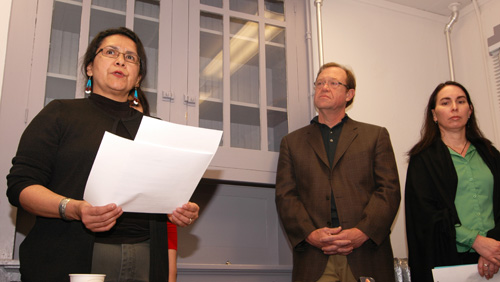Undressing the Chief
January 19, 2007
The painted turkey feathers that adorn the headdress of Chief Illiniwek were at one time eagle feathers. Now they, and the rest of the beaded buckskin regalia, are the center of a new controversy surrounding the University symbol.
On Wednesday, the Executive Committee of the Oglala Sioux Tribal Nation passed a resolution addressed to the University President B. Joseph White, Chancellor Richard Herman and the Board of Trustees demanding the return of Chief Illiniwek’s regalia and the original eagle feathers to Mel Lone Hill, descendent of spiritual leader Frank Fools Crow. Fools Crow presented the regalia to the University in September 1983 during a football halftime show.
According to the resolution, Lone Hill, grandson of Fools Crow and a tribal leader, asserts that Fools Crow was disappointed in how the University made use of the regalia.
The resolution also demanded that the University cease using any Lakota regalia for Chief Illiniwek. Further, the Oglala now support a Peoria Tribe resolution from 2000 that requests the University retire the Chief and “recognize the demeaning nature of the characterization of ‘Chief Illiniwek.'”
The resolution cited a number of reasons for the demands, calling Chief Illiniwek a “disrespectful representation of the Kaskaskia, Peoria, Piankeshuw and Wea nations” – traditionally the Illinois tribes the Chief is supposed to honor. The document also accuses the “antics” of those portraying the Chief as perpetuating “a degrading racial stereotype that reflects negatively on all American Indian people.”
Get The Daily Illini in your inbox!
It further references the original eagle feathers of the Chief’s headdress, which have been replaced by painted turkey feathers.
According to the resolution, the University failed to return the feathers to Fools Crow’s family at their request.
The administration’s response is lukewarm.
“The University will take the (Oglala Sioux) resolution under advisement,” said Tom Hardy, University spokesperson. He also said the consensus resolution adopted by the University in June 2004 will continue to guide the future of the Chief. This resolution says that a decision on the Chief will be made once all parties have reached an agreement.
“Obviously they timed this publicity effort to coincide with the Board of Trustees’ meeting,” Hardy said.
American Indian Studies faculty members assert this resolution was presented to the University based on the schedule of the tribe’s executive council, not the Board of Trustees.
Nor was it a reaction to the recent Facebook controversy in which an American Indian student was threatened by another student on a pro-Chief Facebook group.
Reactions to the resolution may be what people would expect. Paul Schmitt, sophomore in LAS, vice president of Students for Chief Illiniwek, a registered student organization, offered this statement: “Students for Chief Illiniwek is deeply saddened by this news and hopes that the University will continue its stirring and dignified tradition (of the Chief).”
Faculty of the American Indian Studies Program and the Native American House support the resolution and request the University take action by returning the regalia and retiring the Chief.
“There can be no misreading of the Oglala Sioux Resolution,” said Debbie Reese, professor of American Indian studies, speaking on behalf of the faculty during a press conference Thursday morning. “Those to whom the Lakota regalia belongs, and whom the Board of Trustees claims to be honoring, have clearly requested that the performance and charade of Chief Illiniwek end.”
Students groups on campus agree. Reem Rahman, junior in LAS and director for the Council on American-Islamic Relations, UIUC chapter, said the resolution is proof that American Indian tribes do not support the Chief.
“The first thought that comes to me is ‘try to prove the Chief is an ‘honorable tradition’ now,” said Rahman. “The answer is repeated and direct: it is not.”
The American Indian Studies faculty added that if the issue were not resolved by the next Board of Trustees meeting on March 13th, they would see to it that it was on the agenda.







